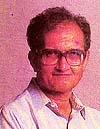

1998 Nobel Prize in Economic Sciences Awarded toPROFESSOR AMARTYA KUMAR SEN
|
|
| The Royal Swedish Academy of Sciences awarded the 1998 Nobel Prize in Economic Sciences to Professor Amartya Sen for his
far-reaching theoretical and empirical work in welfare economics.
In a press release announcing the Award the Academy noted that: "Amartya Sen has made several key contributions to the research on fundamental problems in welfare economics. His contributions range from axiomatic theory of social choice, over definitions of welfare and poverty indexes, to empirical studies of famine. They are tied closely together by a general interest in distributional issues and a particular interest in the most impoverished members of society. Sen has clarified the conditions which permit aggregation of individual values into collective decisions, and the conditions which permit rules for collective decision making that are consistent with a sphere of rights for the individual. By analyzing the available information about different individuals' welfare when collective decisions are made, he has improved the theoretical foundation for comparing different distributions of society's welfare and defined new, and more satisfactory, indexes of poverty. In empirical studies, Sen's applications of his theoretical approach have enhanced our understanding of the economic mechanisms underlying famines ... | |
 |
Amartya Sen was born in Bengal in 1933 and is a citizen of India. Refer CV . He received his doctorate from the University of Cambridge, U.K. in 1959 and has been professor in India, the U.K. and the U.S. In 1998 he left his professorships in economics and philosophy at Harvard University to become Master of Trinity College, Cambridge U.K. - the first non-English person to hold that position. |
"Amartya Sen occupies a unique position among modern economists. He is an outstanding economic theorist, a world authority on social choice and welfare economics. He is a leading figure in development economics, carrying out path-breaking work on appraising the effectiveness of investment in poor countries and, more recently, on famine. At the same time, he takes a broad view of the subject and has done much to widen the perspective of economists." "[Sen] has a mind like a searchlight, illuminating his material with an intense lucidity; he has a gift for looking at assumptions his colleagues have long taken for granted, and finding them defective...From the body of work represented by this book, [Sen] emerges as one of the profession's most remarkable protagonists of the forces of reason. Massively researched, scrupulously referenced...a share of these papers would be a satisfactory lifetime's achievement for many academics: but they are only a fraction of his durable and wide-ranging accomplishments. And they are written with a combination of humanity, rigor, elegance and force that puts him in the most rare and distinguished company."Bengal Online salutes this Bengali hero for his lifetime of contributions for better understanding of the plight of the poor and for how such knowledge can be applied to mitigate the effect of disparities in wealth distribution. In this connection we note that Professor Sen's ex-wife Navaneeta Sen is a well established and highly regarded Bengali writer. Professor Sen is the second Bengalee to be honoured by the Nobel Foundation. The first Bengalee to receive this coveted prize in literature was the Bengalee poet Rabindranath Tagore in 1913. See our PRIDE OF BENGAL pages for more details on Tagore, Sen and other Bengali Greats. You can see our Greeting to Professor Sen page and his acknowledgement. | |